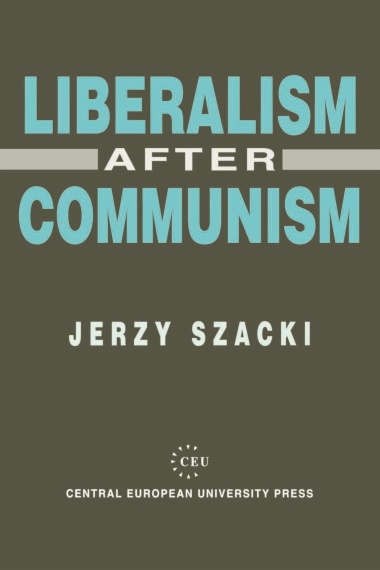This study is devoted to recent developments in Central European (especially Polish) political thought, and concentrates on the emergence of liberal ideas, a subject largely neglected by Western observers. It provides a clear account of protoliberal and liberal thinking in Central Europe both before and after 1989, a critical appraisal of the democratic opposition to communism, and an analysis of economic liberalism as its rival orientation. The author examines the changes which occur in classical liberal ideas when they are implemented in a region with practically no liberal tradition and no socioeconomic infrastructure, and shows how liberal ideas in Central Europe are becoming constructivist, functioning as the ideological justification for a new kind of Utopian social engineering that aims at constructing capitalism.
- cover
- Front cover
- Contents
- Acknowledgments
- I. Introduction
- 1. The discovery of liberalism in Eastern Europe
- 2. The actuality of liberalism
- 3. Has liberalism scored a victory?
- 4. Response to the challenge
- 5. The problem of the migration of ideas
- 6. What is this book about?
- II. Instead of a Definition of Liberalism
- 1. The difficulty of defining liberalism
- 2. Banalized liberalism
- 3. Who is a liberał in Eastern Europe?
- 4. A temperament or a philosophy of life?
- 5. The language of the rights of the individual
- 6. The problem of economic liberalism
- 7. A multitude of liberalisms
- III. Historical Background
- 1. Eastern Europe vis-a-vis the West
- 2. The myth of the 'golden freedom' of old Poland
- 3. Economic backwardness and the absence of a liberał tradition
- 4. Non-economic reasons for the weakness of liberalism
- 5. Liberał ideas in interwar Poland
- 6. Communism versus liberalism
- IV. Protoliberalism: Autonomy of the Individual and Civil Society
- 1 . Liberalism as communism a rebours
- 2. A question about the 'liberalism ' of the democratic opposition
- 3 . 'Anti-political ' politics
- 4 . Autonomy of the individual and individualism
- 5 . Collective individualism
- 6 . The private and the public
- 7 . Towards a civil society
- 8 . The problem of the theoretical tradition
- 9. What is civil society?
- 1 0 . Civil society vis-a-vis the morał unity of citizens
- 11 . A society without an economy
- 12 . Limitations of the idea of civil society
- 13 . Is this really protoliberalism?
- 14. The collectivism of Solidarity
- 15 . Conclusion
- V. Economic Liberalism: 'Neglected Path of Anti-communism'
- 1. 'Creative' versus 'revolutionary' anti-communism
- 2. Direction of the reorientation
- 3. Various dimensions of the liberał reorientation
- 4. Capitalism in a communist state
- 5. How can communism be liquidated?
- 6. A different civil society
- 7. Liberalism as a whip against the left
- 8. Liberalism after 1989: the perspective of the big leap
- 9. Capitalism as an ideological project
- 10. The sin of constructivism
- 11. The allure of authoritarianism
- 12. 'Pragmatism' or etatism
- 13. The legacy of socialist etatism
- 14. The political crossroads of applied liberalism
- 15. Conclusion
- VI. Does Political Liberalism Exist in Poland?
- 1. How far does liberalism reach?
- 2. Liberalism versus Christian values
- 3. The situational and doctrinal context
- 4. The line of di vision
- 5. Is dialogue possible?
- 6. The weakness of political liberalism
- VII. Epilogue
- Index ofNames
- back cover

